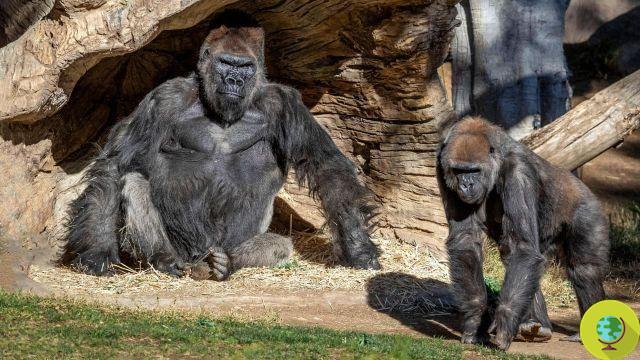
Some gorillas at the San Diego zoo in California have tested positive for covid after being infected probably by a caretaker
What had been feared for some time happened: two gorillas in captivity were infected by humans with Covid. Primates are the animals most similar to humans and therefore more susceptible to contagion, Jane Goodall and her foundation had already underlined, sounding the alarm about the risks for these species that resemble us so much.
Some gorillas at the San Diego Zoo in California have tested positive for the coronavirus, it was probably one of the keepers of their enclosure, who was sick but asymptomatic and who, according to the zoo managers, had always followed safety recommendations, including wearing personal protective equipment when near animals.
An episode that shows once again how it is not humans (as initially thought) who are at risk of being infected by animals but the exact opposite (and a recent study has also shown this). In addition, primates are the ones that risk the most, as they are similar to human beings.
In fact, as we read on The Jane Goodall Institute of Canada website:
“The COVID-19 virus was found to share 96% of its structure with the bat coronavirus along with the crucial amino acids from Malayan pangolins that help the virus bind to human ACE2 receptor proteins in cell membranes. Humans and non-human primates have nearly identical ACE2 proteins in their cells, presenting a concern to scientists and conservationists who the current coronavirus pandemic may be equally damaging to primates. While there is still no confirmed case of COVID-19 in wild primates, their close relationship with humans is a cause for serious concern. "
Now what was feared has happened. Fortunately, however, the primates, which at the moment are the first to be infected in the USA (and perhaps in the world), seem to be doing well and have only mild symptoms, they also continue to eat, drink and interact with each other as normal.
"Aside from some congestion and a cough, the gorillas are fine," said Lisa Peterson, executive director of San Diego Zoo Safari Park.
The tests were performed at the moment only on the 2 gorillas who presented the symptoms and it seems that a third (asymptomatic) is also positive. Obviously, it is not excluded (indeed it is probable) that the other primates, given that they all live together, are equally infected (or will soon be).
Veterinarians are closely monitoring the plight of the 8 gorillas and have made it known that they should all get better.
The risks for primates
The Jane Goodall Foundation points out that disease is a major threat to primates after habitat loss and hunting.
"Over the past 60 years, great ape populations across Africa have experienced deadly outbreaks of common human-transmitted diseases such as human respiratory syncytial virus (HRSV), human metapneumovirus (HMPV) and human C rhinovirus." .
It is therefore not surprising that, in the midst of the pandemic, there is particular concern for the health of these animals which, just like us, are prone to respiratory diseases that can even cause death.
Among other things, that of gorillas is certainly not the first case of human-to-animal transmission.
In April, a tiger was infected at the Bronx Zoo in New York City while in December the first coronavirus infection in the United States was recorded in a snow leopard at the Louisville Zoo in Kentucky.
Fonti: San Diego Zoo / New York Times / The Jane Goodall Institute of Canada
Read also:
- Not just minks. Here are the animals most susceptible to the coronavirus (after humans)
- Don't panic! Dogs and cats tested positive for COVID-19 but humans transmit the virus (and not vice versa)


























